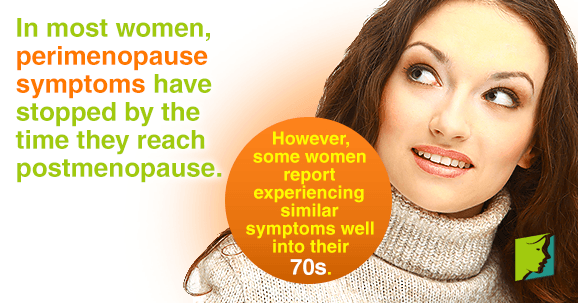Menopause is a confusing time that affects every aspect of a woman's life. The hormone estrogen, which many of your body's functions is dependent upon, is no longer produced in the amount that it once was, resulting in physical and emotional changes. There are many symptoms associated with depleted estrogen levels including mood swings, hot flashes, weight gain, depression, and diminished sex drive. Depending on a woman, she may experience all of these symptoms or none; and they may be intense or mild. Thankfully, symptoms do not usually last the rest of a woman's life. Continue reading to learn more about what to expect and when symptoms start to subside.
When Do Symptoms Start?
The definition of reaching menopause means that a woman has been period-free for a solid year. The symptoms that most people usually associate with menopause are actually a byproduct of the perimenopausal stage. That means that symptoms usually begin in perimenopause, or the years leading up to menopause when estrogen levels begin to diminish. Perimenopause can start as young as a woman's early 40s, or as late as 50. The average age for reaching menopause is 51.
What Are the Symptoms of Menopause?
There are 34 symptoms of menopause, though some are more common than others. Each woman has a different experience with menopause, with some of the most common symptoms including:
- Hot flashes
- Weight gain
- Mood swings
- Depression
- Vaginal dryness
- Night sweats
- Irregular periods
- Fatigue
When Do Symptoms Subside?
By the time a woman reaches menopause, her body has become accustomed to the new levels of estrogen (either naturally or through medication) and symptoms begin to decrease in severity and frequency. After a woman reaches menopause, she enters a stage known as postmenopause. By the time a woman is postmenopausal many of her symptoms will have stopped. However, this is completely dependent on the individual, as some women have reported experiencing hot flashes until their 70s.
Recommendation
There are many menopause symptoms that could last years if left untreated. Though they generally stop upon reaching postmenopause, symptoms can be unbearable for some women, and treatment options are available. Medicine ranges from the hormonal to natural, and lifestyle changes can include acupuncture and yoga. Any form of treatment works best when paired with a healthy lifestyle. Talk to your doctor about which treatment is best for you, while you are waiting for your menopause symptoms to stop. To learn more, click on the link below.
Sources
- The Cleveland Clinic. (2014). What is Perimenopause, Menopause, & Postmenopause?. Retrieved August 6, 2014, from http://my.clevelandclinic.org/disorders/menopause/hic-what-is-perimenopause-menopausepostmenopause.aspx
- National Health Service UK. (2014). Menopause. Retrieved August 6, 2014, from http://www.nhs.uk/conditions/menopause/pages/introduction.aspx
- Office on Women's Health. (2010). Menopause. Retrieved August 6, 2014, from http://www.womenshealth.gov/menopause/menopause-basics/#a




